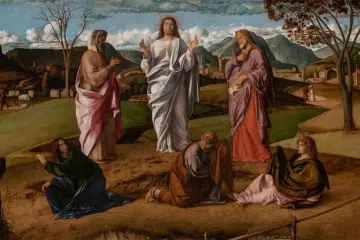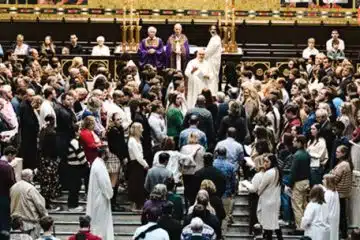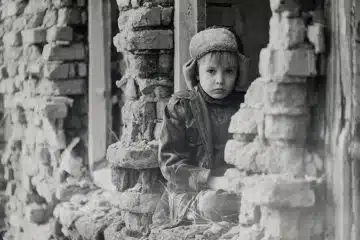The Virtue of Solidarity and the Vice of Alienation
The Catechism of the Catholic Church refers to solidarity as a “virtue” (no. 1942). Like any other virtue, solidarity develops through the practices and habits of moral agents. Solidarity is both essential to true human being and the virtue by which our fallen social nature is to be restored. The solidarity of all human persons is the mandate to structure our moral lives consistently with that nature. As Pope St. John Paul II put it in his encyclical Solicitudo Rei Socialis, solidarity is “not a feeling of vague compassion or shallow distress … On the contrary, it is a firm and persevering determination to commit oneself to the common good; that is to say the good of all … because we are all really responsible for all” (no. 38).
This is echoed by Pope Francis, who explains in Fratelli Tutti, “Solidarity means much more than engaging in sporadic acts of generosity. It means thinking and acting in terms of community. It means that the lives of all are prior to the appropriation of goods by a few” (no. 116). Considered this way, solidarity is rooted in the virtue of justice, defined as rendering to another his due. As common members of the one human race, we are responsible for one another. Solidarity as a virtue, according to Pope St. John Paul, is “a commitment to the good of one’s neighbor with the readiness … to ‘lose oneself ’ for the sake of the other” (Solicitudo Rei Socialis, no. 38).
The doctrine of solidarity is rooted in the first two creation accounts in Genesis 1 and 2. In the first, Genesis 1:27 simply declares, “God created man in his image; in the divine image he created him; male and female he created them.” As created in the image and likeness of God, the human person shares in the essential social nature of the Triune God—the eternal fellowship of love among Father, Son, and Holy Spirit.
The solidarity of the Holy Trinity is eternally inseparable. This is illustrated even in the Garden of Gethsemane, when Jesus says, “Father, if you are willing, take this cup away from me” (Lk 22:42a). As fully man, Jesus experienced many of the same temptations and impulses toward weakness that we all experience. He is not one “who is unable to sympathize with our weakness, but one who has similarly been tested in every way, yet without sin” (Heb 4:15). But in the same breath in which he asks that the cup be taken away, Jesus says, “Still, not my will but yours be done” (Lk 22:42b). This is because the will of the Holy Trinity is no more divisible than God himself. Solidarity is an intrinsic quality of the Triune God. Made in his image, the human person participates in that solidarity, looking to it as a model for structuring our own lives together.
The second creation account in Genesis 2 similarly suggests the doctrine of solidarity. By a different literary style, the second chapter’s author gets us to the same conclusion as the first. “It is not good for the man to be alone,” God says. “I will make a suitable partner for him” (Gn 2:18). The author then tells us that no partner is suitable for the man other than the one taken from his very being: “This one … is bone of my bones and flesh of my flesh” (Gn 2:23).
Using a Hebrew pun, the author causes the man to say, “This one shall be called ‘woman’ [Hebrew ishah] for out of ‘man’ [Hebrew ish] this one has been taken” (Gn 2:23). This tells us that the first person is not complete without the other; and that the other is only known in reference to the first. I use the terms “first” and “other” in this context to emphasize that humans are both dependent upon and known in relation to one another, without regard to the different sexes. For the purposes of this consideration, dependency and identity are the critical points. This description of the human person’s essential social nature is the basis for the Church’s understanding of solidarity.
Like every other perfection by which the human was created, this lived perfection of dependency and identity comes undone in the account of humankind’s fall in Genesis 3 and 4. The alienation between the man and woman caused by the fall is not their natural state, but rather their fallen state after their pretension to place themselves in the place of God.
Similarly, when Cain slew Abel, God asked Cain, “Where is your brother?” Cain’s response was a petulant non-answer: “I do not know. Am I my brother’s keeper?” (Gn 4:9). Even apart from his brother’s murder, Cain’s action symbolizes man’s alienation from man when he denies the truth of his social nature.
Rather than affirm solidarity with his brother, Cain separated himself from Abel. The “natural” result from this rejection of solidarity was Cain’s own banishment from the natural community of others. As a “restless wanderer on the earth” (Gn 4:12), Cain was alienated from all other people. And since solidarity means we only know ourselves in relationship to others, Cain was alienated from himself. This alienation is symbolized when Cain builds the first city, which, like all ancient cities, would have had thick, tall walls, separating those within from those without. When solidarity is denied or compromised, alienation follows.
The task of the moral life in Christ, then, is to work toward the restoration of the solidarity of all human beings. This has profound importance for a host of political, legal, social, and other public issues, including employee/employer relationships, immigration policy, penal reform, the nature of the family, and health care policy. When we deny solidarity with one another, we eat from the forbidden tree or slay our brother Abel, just as did Adam and Eve and Cain, respectively. ✣
 Dr. Kenneth Craycraft holds the James J. Gardner Chair of Moral Theology at Mount St. Mary’s Seminary & School of Theology. He is the author of Citizens Yet Strangers: Living Authentically Catholic in a Divided America.
Dr. Kenneth Craycraft holds the James J. Gardner Chair of Moral Theology at Mount St. Mary’s Seminary & School of Theology. He is the author of Citizens Yet Strangers: Living Authentically Catholic in a Divided America.
This article appeared in the September 2025 edition of The Catholic Telegraph Magazine. For your complimentary subscription, click here.














